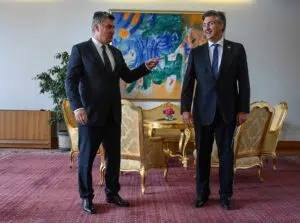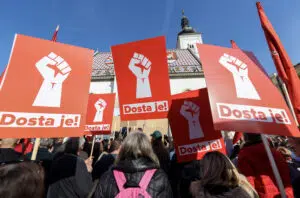Brussels – There will be no showdown between the two heavyweights of politics in Croatia, who for years have monopolized public debate with their personal and often endless institutional clashes. A head-to-head contest between the outgoing Prime Minister, Andrej Plenković, and the incumbent President of the Republic, Zoran Milanović, seemed ready to take place at the early elections on April 17 for the renewal of the Croatian Sabor (the national Parliament), after the latter’s surprise announcement that he was running as the premier candidate for the Social Democratic Party of Croatia (SDP). However, today (March 18) Croatia’s Constitutional Court barred President Milanovic from running for Prime Minister while still in office.

On Friday (March 15), Milanović announced the dissolution of the national legislative body, calling for a snap election on April 17 (a Wednesday), according to what had already emerged at the institutional level over the past few weeks. But the president of the Republic in office since 2020 and former premier between 2011 and 2016 – charged by the national constitution with deciding the date on which to call the polls – surprised journalists and voters by announcing his candidacy for prime minister at the head of the Croatian Social Democrats: “I promise a determined and clean government,” Milanović announced. Outgoing Prime Minister Plenković – who is president of the Croatian Democratic Union (HDZ) – had already anticipated that he would continue to lead his conservative center-right party in the constituency that includes the center of the capital Zagreb as a candidate to succeed himself for a third consecutive term since 2016.
 The vote to renew parliament was supposed to be in the fall. However, the government opted to hold it before the European elections in June (voting will take place Sunday, June 9), kicking off the super-election year campaign in Croatia. In addition to parliamentary and European elections, there will be presidential elections in December. Milanović’s candidacy could respond to an attempt to remain in power for another four years. “At last, the mask has fallen: we had a hidden opposition leader, and now we have a calculating president,” the outgoing premier Plenković immediately attacked. The biggest criticism is that, in running for the leadership of an opposition party in the elections, Milanović will not resign as president of the Republic but will do so only if he is appointed prime minister. This choice is raising not a few concerns among potential allies of the Social Democratic Party, such as the environmentalist leftist Možemo, before the ruling by the Constitutional Court.
The vote to renew parliament was supposed to be in the fall. However, the government opted to hold it before the European elections in June (voting will take place Sunday, June 9), kicking off the super-election year campaign in Croatia. In addition to parliamentary and European elections, there will be presidential elections in December. Milanović’s candidacy could respond to an attempt to remain in power for another four years. “At last, the mask has fallen: we had a hidden opposition leader, and now we have a calculating president,” the outgoing premier Plenković immediately attacked. The biggest criticism is that, in running for the leadership of an opposition party in the elections, Milanović will not resign as president of the Republic but will do so only if he is appointed prime minister. This choice is raising not a few concerns among potential allies of the Social Democratic Party, such as the environmentalist leftist Možemo, before the ruling by the Constitutional Court.

The decision to bring forward the legislative elections came after weeks of protests in the country’s major cities. In addition to mounting pressure from individual professional groups over dissatisfaction with the policies of the Zagreb executive – from teachers to judges and doctors over salaries, to journalists against changes to the Criminal Code to make it a crime to publish leaks – it was the center and leftist parties that catalyzed the desire to “defend democracy.” In particular, the protests concerned the appointment of Ivan Turudić as prosecutor general with the green light from Croatian deputies (the swearing-in took place on March 13) due to his proximity to the HDZ and Plenković’s possible protection from corruption cases should he lose his immunity after the next election round. The united oppositions had excluded right-wing parties such as the Eurosceptic conservatives of Most and the nationalists of the Patriotic Movement from the united front since their criticism of the outgoing government is about not being tough enough on migration policies.
Find more insights on the Balkan region in the newsletter BarBalkans hosted by Eunews
English version by the Translation Service of Withub





